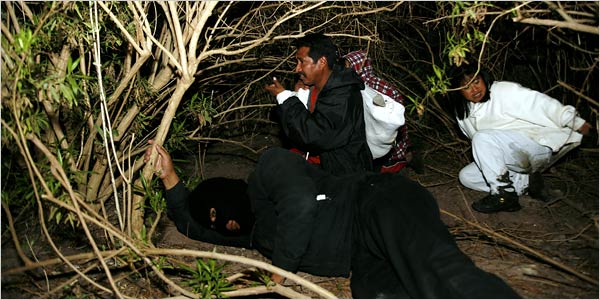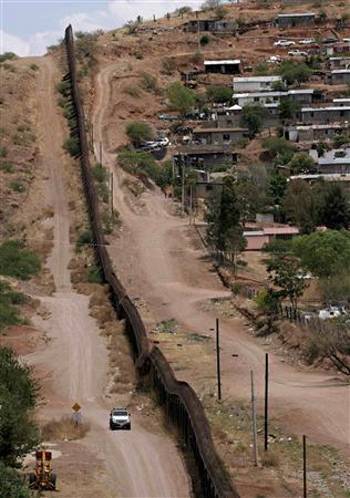US recession has slowed illegal border crossings from Mexico

VILLA JUÁREZ, Mexico – At 21, Esteban Rodríguez says he should be in Dallas or Houston by now, not jobless in a one-street town in San Luis Potosí, a state that sends many of its sons and daughters to North Texas.
He’s even more anxious to leave than José Meléndez, 18, who has a friend in Dallas and would like to be there – yesterday.
But both men are staying put because of a unique situation in their short lifetimes: The worst U.S. recession in decades and tough immigration enforcement make crossing the border illegally a gamble too big to take.
The result: Out-migration from states like San Luis Potosí has slowed.
"What if I get there and there are no jobs?" Rodríguez said in the rapid-fire Spanish of restless youth. And that’s assuming he could get the $2,500 for a smuggler in a country where the minimum wage is $5 a day. "Right now, it’s better to wait and see."
Mexicans from places like San Luis Potosí, Zacatecas and Michoacán practically have an immigration chip embedded in their DNA, causing them to flee as puberty subsides and America calls to them, often through relatives already there.
Reality has overcome that drive, however.
Analysts agree that the number of illegal Mexican immigrants in the U.S. is falling for the first time in a long time as young people stay put in places like San Luis Potosí and do not replenish those who return home for a variety of reasons, some of them economic ones.
Meléndez, the 18-year-old from Villa Juárez, said word from his friend in Dallas is that the employment situation is dicey for illegal workers. "She says she’s working just two days a week, so I am trying to make it here for now," he said. "Maybe I’ll go later."
At the same time that many would-be immigrants are staying put, a recent study suggested that an exodus of immigrants from the U.S. was under way, although other U.S. and Mexican authorities dispute that.
Citing U.S. Census Bureau data, a July study by the "pro-immigrant, low-immigration" Center for Immigration Studies found that the Hispanic illegal immigrant population had "declined by 11 percent through May 2008 after hitting a peak in August 2007." The decline, it said, was 1.3 million people – from 12.5 million to 11.2 million – and was mostly "illegal immigrants leaving on their own."
That report was cheered by groups opposing illegal immigration as a vindication of their promotion of tough enforcement to dry up jobs and seal the border.
One of the authors of the report, said the decline was due to "a reduction in new arrivals and an increase in out-migration."
He added: "If you could get 2 million of these people to leave, you could get 2 million jobs for less-educated Americans."
Jeffrey Passel, a senior demographer at the Pew Hispanic Center in Washington, took issue with the reported 1.3 million drop, noting the seasonal ups and downs of immigrant labor. And he suggested that tougher enforcement was keeping immigrants in the U.S.
"In a regime with stepped-up border enforcement, the idea of riding it out would seem more attractive because of the difficulty of getting back," he said.
Two new studies, by Mexico’s El Colegio de La Frontera Norte and Washington’s Migration Policy Institute, also suggested that illegal workers were mostly staying in the U.S. because of the difficulty of returning and to keep whatever employment they may have.
Many Mexican officials concur.

"We have very good contact with San Luis Potosí communities over there [in the U.S.], and the question we ask them is if they are thinking about returning," said Victor Torres, head of the office of migrant attention in San Luis Potosí.
"And they tell us that, ’Well, no, we are not ready to go back to Mexico,’ " he said. "They left seeking a better life and had to go through a series of difficult challenges and complex situations, and our people don’t give up."
Mr. Torres said an estimated 30,000 immigrants returned to his state for the holidays, down from the traditional number of 50,000. Why? To preserve their jobs and because returning has become too hard because of border enforcement.
Mexico’s consul general in Dallas, Enrique Hubbard Urrea, said in a meeting with Dallas Morning News editors last month that immigration to North Texas was flat – "not growing, but not shrinking."
He also noted that immigrants were coming to North Texas from other parts of the U.S., possibly because the economy isn’t as bad here as it is elsewhere.
Mexican officials at the national and state level are fairly uniform in denying that a large return migration is occurring, but some officials at the local level paint a different picture.
In the San Luis Potosí hills near Villa Juárez, the mayor of the much larger town of Cerritos said a wave of return migration has sparked an increase in crime "by desperate youth" and the creation of temporary jobs programs by the government.
Mayor Salvador Martínez Sifuentes said that about one-third of the town’s 25,000 people are in the U.S. at a time, and that hundreds if not thousands have returned recently as a result of the U.S. recession.
"We don’t have numbers," he said, "but one parameter that we use is the closing of the exchange houses. Their financial transactions have dropped by 50 percent in the buying and selling of dollars, and that gives you an idea of what the situation is like."
His colleague down the road, Villa Juárez City Manager Mauricio Chávez Castro, said things were normal in his town.
"I would not say, for example, that a hundred families have returned, no," he said, adding that not a single returned immigrant had signed up for the town’s temporary work program.
José Luis Madrigales, 25, returned to Villa Juárez from a job in Tampa, Fla., after his 60 hours a week at $13.50 an hour were cut in June.
But four of his friends went back to the U.S. and are working.
For now, he’s content to work in a hardware store for much less. In the U.S., he said, "there’s not much work, and now you need legal papers."
Enter the Green Card Lottery. 55,000 Green Cards Must Go Each Year. Let us help you reach your dream of becoming an American resident today! |
 |
Return to USA Diversity Lottery’s immigration news page to read more immigration news.
Green Card Test

Take the free test to see if you qualify. If you do, apply for the USA Diversity Visa Green Card Lottery here on the Official USA Diversity Lottery site and your dreams may soon come true. 55,000 diversity immigrant visas (Green Cards) available in the lottery every year. Take the free test NOW!
Immigration News
February 11, 2009
US recession has slowed illegal border crossings from MexicoFebruary 9, 2009
Obama administration postpones employment regulationFebruary 5, 2009
Stricter US Visa Rules May Hit Indian IT FirmsFebruary 3, 2009
Will the Obama Administration Impact Immigration?February 01, 2009
Shoudl Illegal immigrants without Social Security numbers get stimulus payments?January 28, 2009
Will illegal immigrants take the stimulus jobs?January 26, 2009
More immigration will test U.S. economy, unityJanuary 22, 2009
Obama and increases in US legal immigrationJanuary 19, 2009
Downturn effect: Britain to shut doors to foreign workersJanuary 16, 2009
Few special immigration visas issuedJanuary 15, 2009
Napolitano Says Fixing Immigration System a PriorityJanuary 12, 2009
Diversity Visa Green Card Lottery (DV2011)January 7, 2009
New US Visit Visa requirements to go into placeJanuary 7, 2009
Obama and US immigration ReformDecember 17, 2008
US opens four new immigration facilities in FloridaNovember 27, 2008
Renewed hope for US retirement visaNovember 24, 2008
Napolitano set to become Obama's secretary of Homeland SecurityNovember 18, 2008
US implements visa free travel policy for more EU statesNovember 11, 2008
Less than a month to enter the DV2010 Green Card LotteryOctober 14, 2008
Obama represents the rise of African migration to U.S.October 8, 2008
Results from DV-2009 green card lotteryJuly 9, 2008
Danish Green Card: Denmark's points based immigration...July 7, 2008
EU backs French immigration pact.